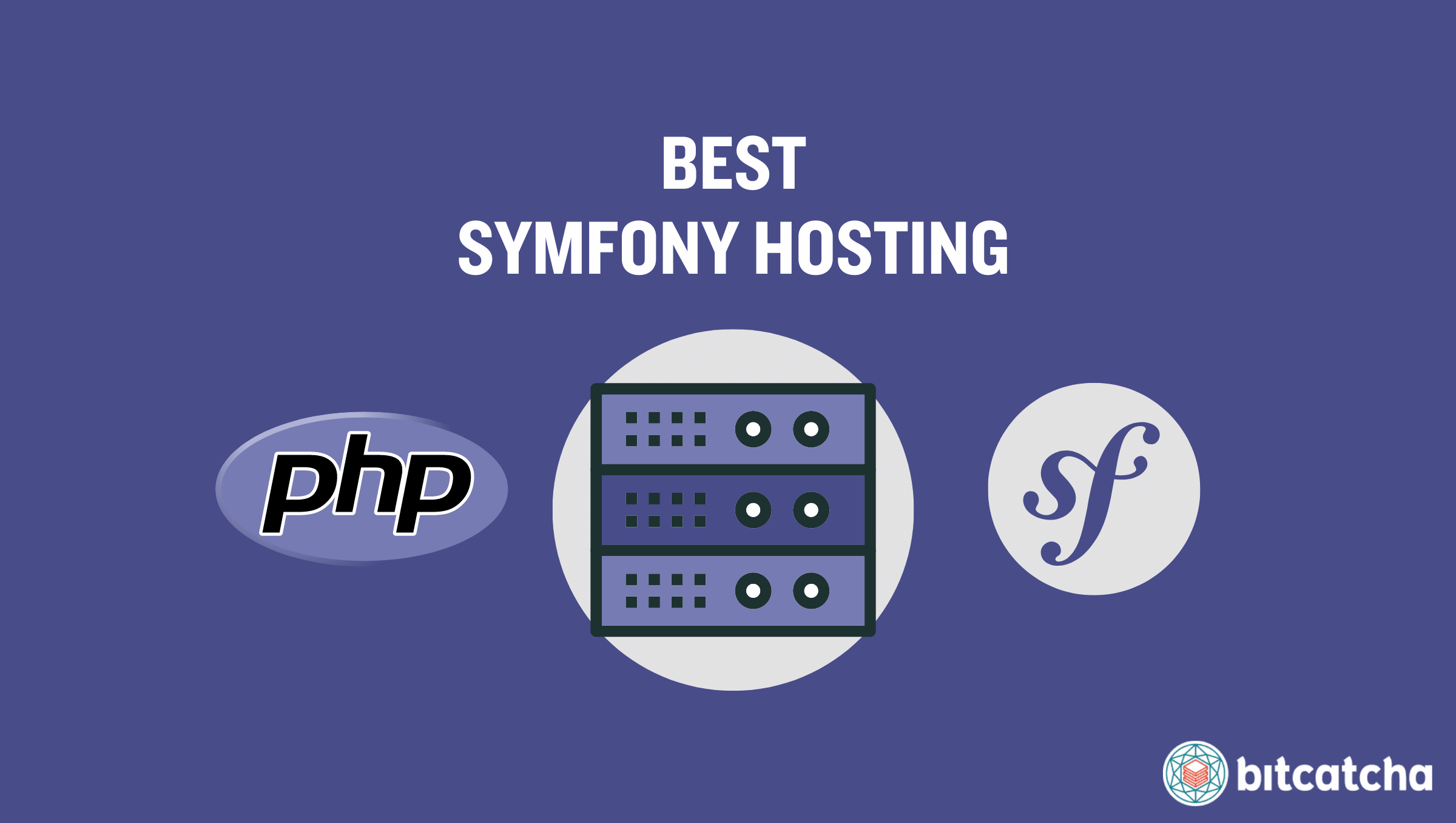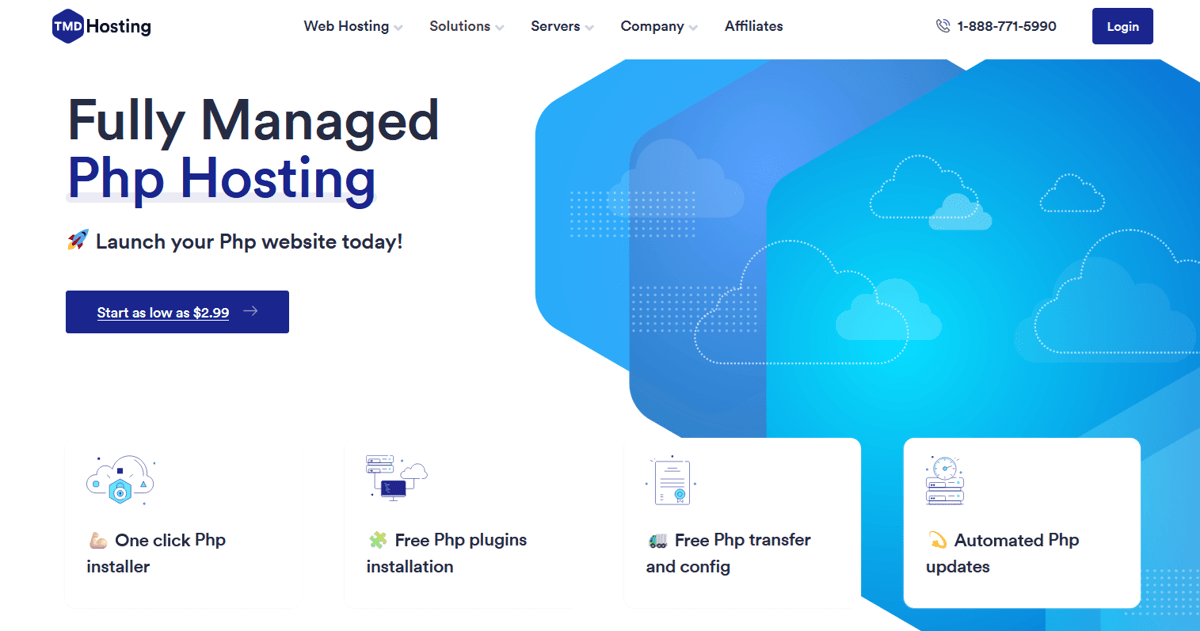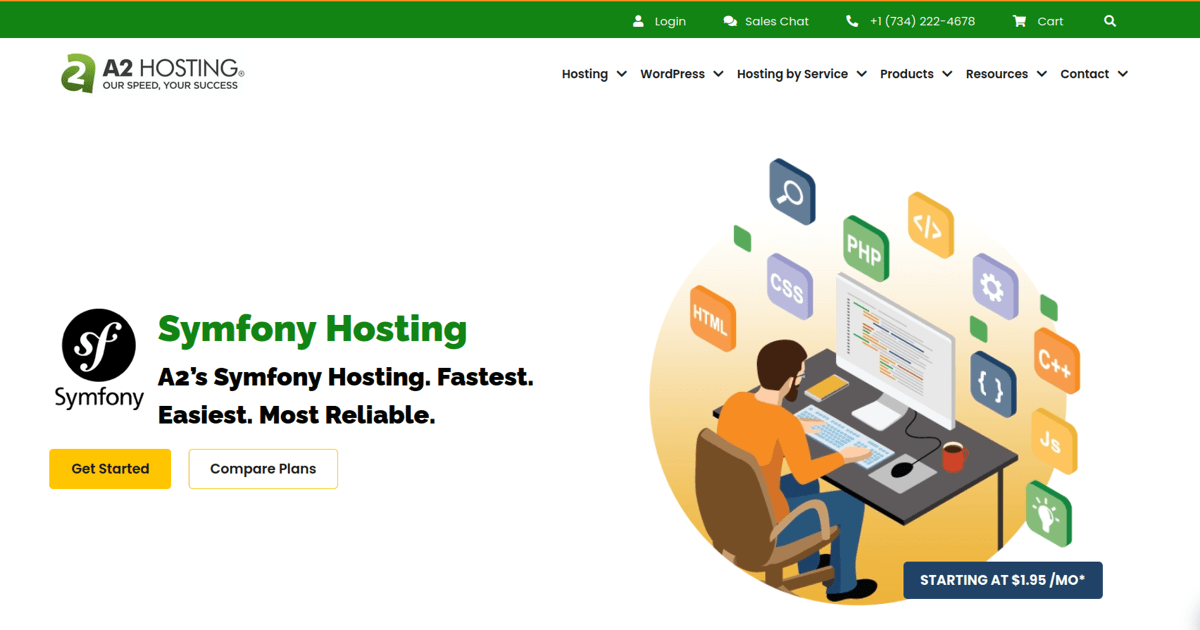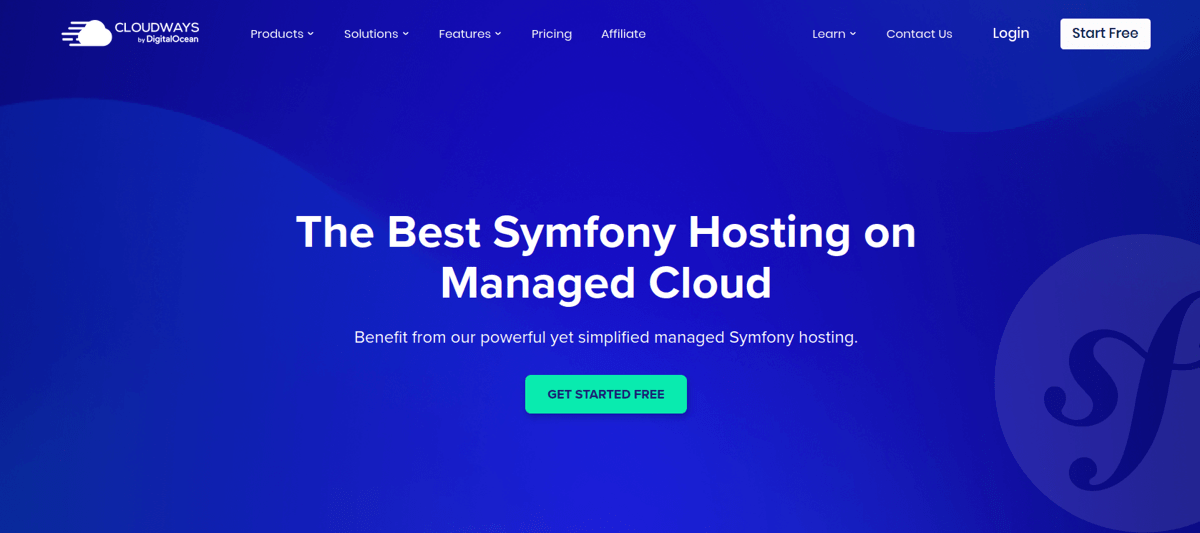The best Symfony hosting providers offer high performance, PHP compatibility, and specialized server configurations to support Symfony-based applications. The top recommended Symfony hosting provider is Hostinger. It delivers fast and reliable performance with Nginx web servers, HTTP/2, and a global network of 9 data centers.
Symfony hosting is a type of web hosting optimized for applications built with the Symfony framework. Symfony is a PHP framework known for its speed, stability, and modular architecture, making it a popular choice for enterprise-level web applications. Symfony hosting offers advantages such as simplified deployment with 1-click Symfony installation and Git integration. It also offers optimized performance with advanced caching mechanisms. Symfony hosting typically costs between $4 and $50 per month. This price range covers shared hosting, VPS (Virtual Private Server) hosting, and cloud hosting options. There is no free Symfony hosting that is realistically viable, but budget-friendly options like Hostinger and DreamHost provide reliable low-cost alternatives .
It’s possible to optimize your Symfony hosting by adjusting configurations in 4 ways. The first is such as dumping the service container into a single file. The second is enabling OPcache class preloading. The third is fine-tuning OPcache settings. The fourth is increasing PHP realpath cache size. The difference between Symfony and Laravel hosting lies in the optimization for their respective frameworks, with Laravel hosting generally preferred for smaller projects.
Top Symfony Hosting Providers


1. Hostinger
https://www.hostinger.com/
Hostinger offers affordable Symfony hosting with great value for money. Their Cloud Startup plan is priced at $8.99 per month. It includes 2 vCPU cores, 3 GB RAM, and 200 GB NVMe SSD storage. It also comes with unmetered bandwidth and supports a wide range of PHP versions from PHP 5.2 to 8.1. The hosting uses Nginx web servers and HTTP/2 for a fast and reliable service. Check our Hostinger review for more details.
What are the pros and cons of Hostinger’s Symfony hosting?
Pros
- 200 GB NVMe SSD storage
- Free daily backups
- Free domain included
- Unlimited free SSL
- 9 data center locations worldwide
- 30-day money back guarantee
- HTTP/2
- Nginx web servers
Cons
- 4 year subscription to get cheapest price

2. TMDHosting
https://www.tmdhosting.com/
TMDHosting offers Symfony hosting with a focus on high performance and reliability. Their Starter plan is competitively priced at $2.99 per month. It features 50 GB SSD storage and supports PHP versions 5.6, 7.1-7.4, and 8.3. TMDHosting operates on CloudLinux servers which ensure enhanced security and stability. Other benefits include a 1-click Symfony installer, automated Symfony updates, and free Symfony transfer and configuration services. Read our thoughts on TMDHosting for more details.
What are the pros and cons of TMDHosting’s Symfony hosting?
Pros
- Free SSL certificate
- Free domain included
- CloudLinux servers
- 30-day money back guarantee
- 6 data center locations worldwide
Cons
- Backups available in higher tier plans only
- Expensive renewal

3. GreenGeeks
https://www.greengeeks.com/
GreenGeeks offers eco-friendly Symfony hosting underpinned by a 300% green energy match. Their Lite plan is priced at an affordable $2.95 per month and supports a broad spectrum of PHP versions from 5.2 to 8.0. The plan also features hosting for one website, 50 GB of storage, and unmetered bandwidth. Users also get Git integration for efficient version control and team collaboration on Symfony projects. Check our GreenGeeks write-up for more details.
What are the pros and cons of GreenGeeks’ Symfony hosting?
Pros
- Free SSL certificate
- Free domain included
- Free nightly backups
- 30-day money back guarantee
Cons
- Most unlimited features available in higher tier plans only
- Expensive renewal price

4. A2 Hosting
https://www.a2hosting.com/
A2 Hosting uses industry-leading Turbo servers that promise up to 20x faster hosting speeds. This makes them a good option for fast Symfony hosting. Their Startup shared hosting plan is priced at an affordable $5.99 per month. It comes with unlimited NVMe SSD storage and unlimited bandwidth to provide ample space and scalability. This plan also supports a wide array of PHP versions from 5.6 to 8.1. Check our A2 Hosting review for more details.
What are the pros and cons of A2’s Symfony hosting?
Pros
- Unlimited NVMe SSD storage
- Free SSL included
- 4 data center locations worldwide
- 30-day money back guarantee
- Turbo servers
Cons
- No free backups provided
- No free domain provided

5. SiteGround
https://www.siteground.com/
SiteGround leverages Google Cloud infrastructure for fast and reliable Symfony hosting. Their GrowBig plan is a shared hosting option priced at $6.69 per month. It provides 20 GB SSD storage and unmetered bandwidth. It also supports modern PHP versions from 7.3 to 8.3. Their Ultrafast PHP setup enhances overall application performance. Check our SiteGround review for more details.
What are the pros and cons of SiteGround’s Symfony hosting?
Pros
- Free daily backups
- Free wildcard SSL
- 11 data center locations worldwide
- 14-day money back guarantee
- Ultrafast PHP setup
- Powered by Google Cloud
Cons
- No free domain provided
- Expensive renewal

6. Kinsta
https://www.kinsta.com/
Kinsta offers premium Symfony hosting services powered by Google Cloud. Their Standard 1 plan is a managed cloud hosting solution priced at $43 per month. It comes with 1 vCPU core and 2 GB RAM. Users get 10 GB of persistent storage with an option to add more at $3 per month. Bandwidth can also be extended at an additional cost of $0.14 per GB. This plan supports PHP versions 8.0, 8.1, and 8.2 to cater to the latest Symfony requirements. Check our Kinsta review for more details.
What are the pros and cons of Kinsta’s Symfony hosting?
Pros
- Free domain included
- 25 data center locations worldwide
- $20 credit in first month
- Powered by Google Cloud
Cons
- Expensive ($43/month)
- No free backups provided
- No free SSL provided
- No money back guarantee

7. DreamHost
https://www.dreamhost.com/
DreamHost offers high-performance VPS hosting suitable for demanding Symfony projects. Their VPS Basic plan is priced at $10 per month. It provides 1 vCPU core, 1 GB RAM, and 30 GB SSD storage. Users also get unlimited bandwidth and support for PHP 8.0 to 8.3. DreamHost incorporates OPcache in this plan for optimized PHP performance. This improves the efficiency of your Symfony applications. Check our DreamHost review for more details.
What are the pros and cons of DreamHost’s Symfony hosting?
Pros
- PAYG (hourly billing) model
- 100% uptime guarantee
- OPcache (PHP optimization)
Cons
- No free backups provided
- 1 data center only (US based)
- No money back guarantee

8. Cloudways
https://www.cloudways.com/
Cloudways offers flexible and user-friendly managed cloud hosting solutions compatible with the Symfony framework. Their DO1GB plan is offered at $14 per month. It includes 1 vCPU core, 1 GB RAM and 25 GB SSD storage. The plan also comes with 1 TB bandwidth and is compatible with PHP versions 7 through 8. This provides a good range of Symfony project support. Check our Cloudways review for more details.
What are the pros and cons of Cloudways’ Symfony hosting?
Pros
- Hourly or monthly billing options
- Free automated backups
- Free SSL provided
- 65 data center locations worldwide
- 3-day free trial (credit card not required)
Cons
- No free domain provided
- No money back guarantee

9. DigitalOcean
https://www.digitalocean.com/
DigitalOcean offers straightforward and cost-effective cloud hosting services. Their Basic Droplet plan is an unmanaged cloud hosting solution recommended for Symfony applications. It’s available at only $4 per month. This plan provides 1 vCPU core, 1 GB RAM, and 25 GB SSD storage. The package is rounded out with 1 TB bandwidth and support for PHP versions 7 to 8.
What are the pros and cons of DigitalOcean’s Symfony hosting?
Pros
- Hourly billing option
- 9 data center locations worldwide
- $200 credit for 2 months
Cons
- No free backups provided
- No free domain provided
- No free SSL provided
- No money back guarantee

10. InMotion Hosting
https://www.inmotionhosting.com/
InMotion Hosting provides dependable and performance-oriented hosting services ideal for Symfony projects. Their shared Launch plan is priced at $4.99 per month. This plan offers unlimited NVMe SSD storage and unlimited bandwidth. It also supports a comprehensive range of PHP versions from 5.6 to 8.2. InMotion’s optimized PHP stack with OPCache and PHP-FPM ensures efficient processing for Symfony applications. Check our InMotion Hosting review for more details.
What are the pros and cons of InMotion’s Symfony hosting?
Pros
- Unlimited NVMe SSD storage
- Free daily backups
- Free domain included
- Free SSL included
- 4 data center locations worldwide
- 30-day money back guarantee
- Optimized PHP stack (OPCache, PHP-FPM)
Cons
- 3 year subscription to get cheapest price

11. IONOS
https://www.ionos.com/
IONOS offers versatile and affordable hosting cloud hosting solutions for Symfony developers. Their Cloud Server XS is an unmanaged cloud hosting plan available at $4 per month. It includes 1 vCPU core, 512 MB RAM, and 30 GB SSD storage. It also provides unmetered bandwidth. The extensive range of supported PHP versions from 4.0 to 8.3 makes it highly compatible with a variety of Symfony applications. Find out more in our IONOS review.
What are the pros and cons of IONOS’s Symfony hosting?
Pros
- PAYG (by the minute) model
- Free wildcard SSL
- 5 data center locations worldwide
Cons
- No free backups provided
- No free domain provided
- No money back guarantee
What Is Symfony Hosting?
Symfony hosting is a type of web hosting optimized for Symfony applications. They offer comprehensive support for a range of PHP versions for broad compatibility and smooth performance. These hosting plans also include access to various databases like MySQL, PostgreSQL, or MongoDB, which are necessary for storing and managing the data of Symfony applications. Users are also granted SSH (Secure Shell) access to securely manage their hosting environment and execute the necessary commands for Symfony deployment and maintenance.
What is Symfony?
Symfony is a PHP framework designed for developing web applications. It is renowned for its fast loading times and stability, which makes it a preferred choice for enterprise-level, highly customized web applications. Symfony’s rich set of features and extensive functionality include the use of Twig templating language, flexible URI routing, and structured MVC architecture. It also provides ease of development with its reusable PHP components and quick debugging solutions. These features minimize turnaround time and errors, which contributes to Symfony’s overall efficiency. Note that the framework does come with a steep learning curve that requires more advanced PHP knowledge.
What Are The Advantages Of Symfony Hosting?
There are 2 advantages of Symfony hosting. Firstly, Symfony hosting offers a simplified deployment process with features like Git integration and one-click setup. These tools streamline the launching of web applications by reducing the complexity and time needed for deployment.
Secondly, Symfony hosting optimizes performance with the appropriate PHP versions and essential PHP extensions. Advanced caching mechanisms are also implemented to improve the speed and responsiveness of these applications.
How Much Does Symfony Hosting Cost?
Symfony hosting costs $4 to $50 per month. This price range gives you access to shared, VPS (Virtual Private Server), and cloud hosting. Shared hosting is the most cost-effective option wherein multiple websites are hosted on one server. VPS hosting represents a mid-range option in both price and performance. Cloud hosting is on the higher end of the pricing spectrum and provides high scalability and flexibility for Symfony applications.
Is there free Symfony hosting?
No, there is no free Symfony hosting that is viable. Hosting Symfony web applications on any plan that’s advertised as free is not advisable due to the demanding requirements of this PHP framework. It’s advisable to instead choose a low priced but reputable provider such as Hostinger and DreamHost. These brands offer very affordable plans that meet the criteria of the best PHP hosting and this makes them well-suited for hosting a basic Symfony web application. They provide sufficient server resources at a cost-effective price, which makes them a good starting point. You can scale up your hosting plan accordingly to ensure continued optimal performance and reliability once your Symfony application demands more resources.
How Can I Optimize My Symfony Hosting?
You can optimize your Symfony hosting by tweaking certain default configurations to enhance performance. Here are four key adjustments you can make:
1. Dump service container into single file
Symfony compiles its service container into several files by default. You reduce I/O operations by dumping these into a single file, which will speed up your application. This is done in the default services.yaml file.
# config/services.yaml parameters: # … .container.dumper.inline_factories: true
2. Use OPcache class preloading
This feature was introduced in PHP 7.4. It allows you to preload frequently used PHP files in memory, which reduces overall load time. Enable class preloading in your php.ini file like so:
; php.ini opcache.preload=/path/to/project/config/preload.php
; required for opcache.preload: opcache.preload_user=www-data
Then, create a preload.php file that lists all the classes to preload.
3. Configure OPcache for maximum performance
Adjusting your OPcache settings will significantly improve Symfony’s performance. Set these configurations in your php.ini file:
; php.ini ; maximum memory that OPcache can use to store compiled PHP files opcache.memory_consumption=256
; maximum number of files that can be stored in the cache opcache.max_accelerated_files=20000
4. Configure PHP realpath cache
The realpath cache size can be increased to improve performance. This cache stores the resolved paths of files and directories. Modify your php.ini with:
; php.ini ; maximum memory allocated to store the results realpath_cache_size=4096K
; save the results for 10 minutes (600 seconds) realpath_cache_ttl=600
Note that it’s important to test and adjust each of these optimizations based on your specific application needs. The official Symfony documentation provides more recommendations on optimization, which includes advanced techniques tailored to your application’s architecture and hosting environment. It is also important to monitor the performance of your Symfony hosting over time to confirm that these optimizations deliver consistent real-world results.
How Can I Monitor The Performance Of My Symfony Hosting?
You can monitor the performance of your Symfony hosting by using a host tracker such as UptimeRobot, Pingdom, GTmetrix, or Bitcatcha Host Tracker. These online tools help you track how well your hosting environment handles traffic and supports your application. Bitcatcha Host Tracker measures server response time and uptime from 1 of 10 locations, helping you verify whether your Symfony hosting setup meets performance benchmarks.
What Is The Difference Between Symfony Hosting And Laravel Hosting?
The main difference between Symfony hosting and Laravel hosting lies in the PHP frameworks themselves. Their hosting setups remain similar. Both Symfony and Laravel are popular PHP frameworks used for web development, but cater to different types of projects.
Laravel is ideal for quickly developing small web applications. It supports the MVC design, includes built-in authentication and session management, and uses the Blade templating engine for dynamic content. Users also get access to the Artisan command-line tool. These features combined with Laravel’s easy learning curve make it efficient for rapid deployment. Laravel hosting provides optimal support for this hosting framework. See the top Laravel hosting providers to explore your options.
Symfony is designed for developing web applications capable of handling high traffic and complex functionalities. It offers a more flexible and modular architecture, which makes it suitable for larger, enterprise-level applications. It offers a robust set of reusable components and high degree of customization
Which Is The Best Symfony Hosting Provider?
The best Symfony hosting provider combines reliable performance, compatibility with Symfony’s requirements, and offers great value for money.
Here is a recap of our top brands:
| Specifications | Hostinger | TMDhosting | GreenGeeks | A2 Hosting | SiteGround | Kinsta | DreamHost | Cloudways | DigitalOcean | InMotion Hosting | IONOS |
|---|---|---|---|---|---|---|---|---|---|---|---|
| Plan name | Cloud Startup | Starter | Lite | Startup | GrowBig | Standard 1 | VPS Basic | DO1GB | Basic Droplet | Launch | Cloud Server XS |
| Plan type | Managed cloud hosting | Managed shared hosting | Managed shared hosting | Shared hosting | Shared hosting | Managed cloud hosting | VPS hosting | Managed cloud hosting | Unmanaged cloud hosting | Shared hosting | Unmanaged cloud hosting |
| PHP version support | PHP 5.2, 5.3, 5.4, 5.5, 5.6, 7.0, 7.1, 7.2, 7.3, 7.4, 8.0, 8.1 | PHP 5.6, 7.1, 7.2, 7.3, 7.4, and 8.3 | PHP 5.6, 7.4, 8.0, 8.2 | PHP 5.6, 7.1, 7.2, 7.3, 7.4, 8.0, 8.1 | PHP 7.3, 7.4, 8.0, 8.1, 8.2, 8.3 | PHP 8.0, 8.1, 8.2 | PHP 8.0, 8.1, 8.2, 8.3 | PHP 7.x, 8.x | PHP 7.x, 8.x | PHP 5.6, 7.1, 7.2, 7.3, 7.4, 8.0, 8.1, 8.2 | PHP 4.0, 5.2, 5.4, 5.5, 5.6, 7.0, 7.1, 7.2, 7.3, 7.4, 8.0, 8.1, 8.2, 8.3 |
| vCPU | $2.00 | 1 | 2 | – | – | 1 | 1 | $1.00 | $1.00 | – | 1 |
| RAM | 3 GB | 1 GB | 1 GB | – | – | 2 GB | 1 GB | 1 GB | 1 GB | – | 512 MB |
| Storage | 200 GB NVMe SSD | 50 GB SSD | 50 GB SSD | Unlimited NVMe SSD | 20 GB SSD | 10 GB persistent storage (+$3/mo addon) | 30 GB SSD | 25 GB SSD | 25 GB SSD | Unlimited NVMe SSD | 30 GB SSD |
| Bandwidth | Unmetered | Unmetered | Unmetered | Unlimited | Unmetered | #ERROR! | Unlimited | 1TB | 1TB | Unlimited | Unmetered |
| Money-back guarantee | 30-day | 30-day | 30-day | 30-day | 14-day | No | No | No | No | 30-day | No |
| Cost/mo (USD) | $8.99 | $2.99 | $2.95 | $5.99 | $6.69 | $43.00 | $10.00 | $14.00 | $4.00 | $4.99 | $4.00 |
| See all features |
Hostinger is our #1 recommendation for Symfony hosting based on these criteria.
